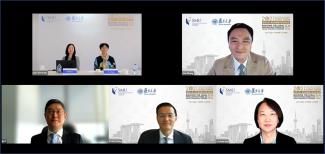
“It is now clear that the law of technology requires a body of law that is especially catered to it. We should no longer be tied to the strictures of the common law as that would be trying to fit traditional legal doctrines to the new technologies.” said Prof Goh Yihan, Dean of SMU Yong Pung How School of Law (YPHSL). He was speaking at the Singapore Management University (SMU) – Fudan University (FDU) Global Forum on 25 November 2021.
Held virtually for the first time, the 9th edition of the Global Forum series convened thought leaders and industry practitioners from Singapore and Shanghai. The half-day Forum provided a platform for them to share knowledge as well as to exchange views and experiences on meeting challenges that arose from rapid financial innovations and fintech advancements.
Attended by some 100 participants from both Singapore and China, the event garnered media interest, with coverage by major Chinese news agencies. The Forum was organised by SMU International Office in line with SMU’s strategic priority area of “Growth in Asia”, where the University sought to offer a deep understanding of Asia’s economy, polity and society.
In his keynote speech titled “The Challenges to Commercial Law Due to Technological Changes”, Prof Goh examined three key technological challenges that might bring about new changes to Singapore’s commercial law, namely artificial intelligence, big data and trust. He suggested for all members of the legal profession to embrace an innovative mindset to cope with the challenges to substantive law and procedural law.
To address or mitigate these challenges, he proposed three possible solutions. They were: (a) Creating greater awareness among future law practitioners, (b) Inventing new technologies to counter the procedural impact of distortion technologies, and (c) Developing new legal solutions that might not necessarily develop from the older traditional doctrines. He also believed that Singapore has much to learn from China, particularly on how the Chinese legal system deals with large-scale commercial problems.
“Shanghai and Singapore have much to learn from each other. I trust this Forum will help researchers and practitioners from both sides to better understand the two regulatory systems in the financial sector, and could stimulate more ideas for future research and education collaborations between the two law schools,” said Prof Jin Li, Fudan University’s President in his welcome remarks.
Concurring, SMU President Prof Lily Kong said that the two universities together would have much to offer to support the two cities. She also affirmed in her welcome remarks that SMU stood ready to contribute to this cause through the University’s three strategic priorities, namely Digital Transformation, Sustainable Living, and Growth in Asia. These three priorities also aligned well with the areas for collaboration identified by the Singapore and Shanghai Municipal Governments.
Together with both university presidents, Singapore’s Consul-general in Shanghai, Mr Chua Teng Hoe witnessed the inking of two new collaborative agreements between both law schools at the event. The first formalises exchange arrangements for Law undergraduate students and the second, expands the current collaboration between our JD/LLM and Fudan’s JM programmes to create new pathways for postgraduate students.
Prof Wang Zhiqiang, Dean of Fudan Law School, put forward his opinions on the cultivation of financial law talents in his keynote titled, “Law and Finance: Mechanism and People. He suggested two possible approaches. One way is to use the finance + law model to allow students to take courses from these two disciplines separately and then integrate these two knowledge systems themselves. Another way is to design systematic courses and practical training specifically for financial law and directly carry out interdisciplinary training. He pointed out that effectively combining both approaches will groom talents to meet challenges of the future.
During a panel discussion, four academic experts and legal industry leaders from Singapore and China engaged in a rigorous discourse on the topic “Rule of Law in Finance - Local Experience and Outlook”. Representing Singapore in the discussion were Assoc Prof Locknie Hsu from SMU YPHSOL and Mr Chong Ik Wei, Partner/Managing Director from Clyde & Co Clasis Singapore, while Prof Xu Duoqi, Director of Fudan Law School’s Centre for Law & Digital Economy and Dr Yan Jia, Partner from Paul Hastings LLP represented Shanghai. Assoc. Prof Zhang Wei, Associate Dean of SMU YPHSOL and Prof Chen Li, Vice Dean of Fudan law School jointly moderated the hour-long dialogue.
Highlighting Singapore’s efforts in building its legal infrastructure as an Asian financial centre, Assoc Prof Hsu cited three key factors shaping law and regulations: Regulatory and Supervisory Oversight; Velocity (of technological change and global developments); and Collaboration. She also pointed out that the Singapore government had always adopted a prudent and forward-looking stance, with good flexibility in laws to adapt to technological advancements.
On the role of arbitration, Mr Chong felt that if Singapore were to continue developing itself as an international arbitration hub, its position as a leading financial centre in Asia would be considerably strengthened. He elaborated on how arbitration centres in Singapore had been leveraging technology, such as virtual mediation and arbitration, real-time simultaneous interpretation, and recording etc. to improve their operational capability and efficiency.
The annual SMU Global Forum series made its debut in 2014 with the aim of providing a high-level dialogue platform for SMU and our leading partner universities in China to share knowledge and exchange insights and experiences on issues, opportunities, and challenges common to Singapore and China in our economic and societal developments. This is the third time that SMU has partnered with Fudan University in organising the flagship event.


